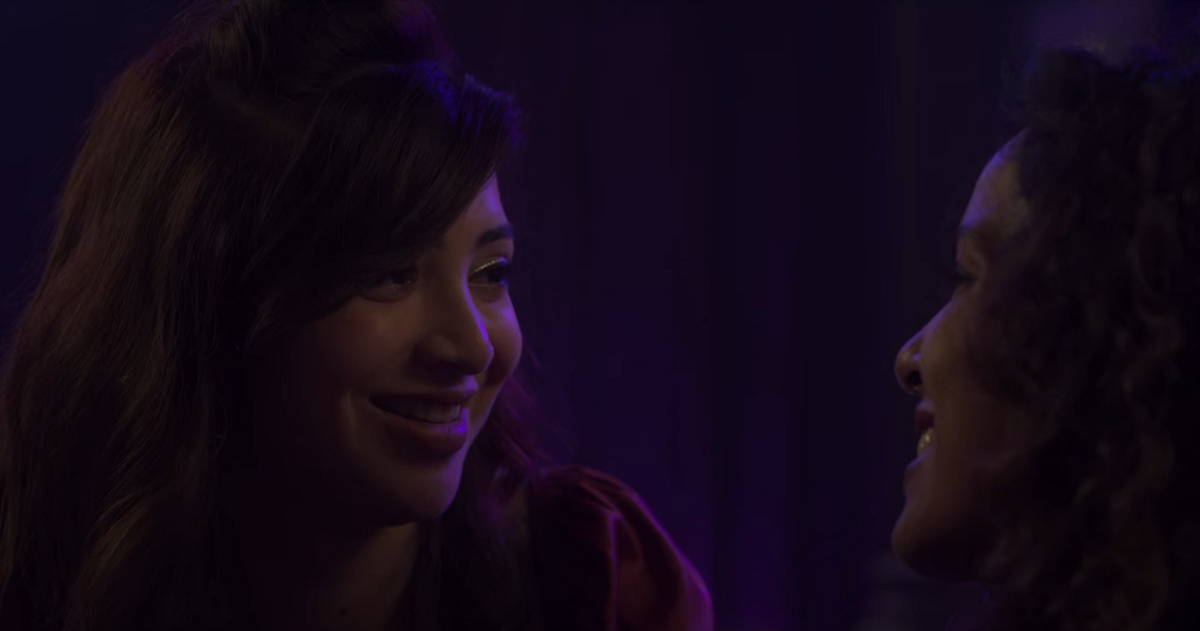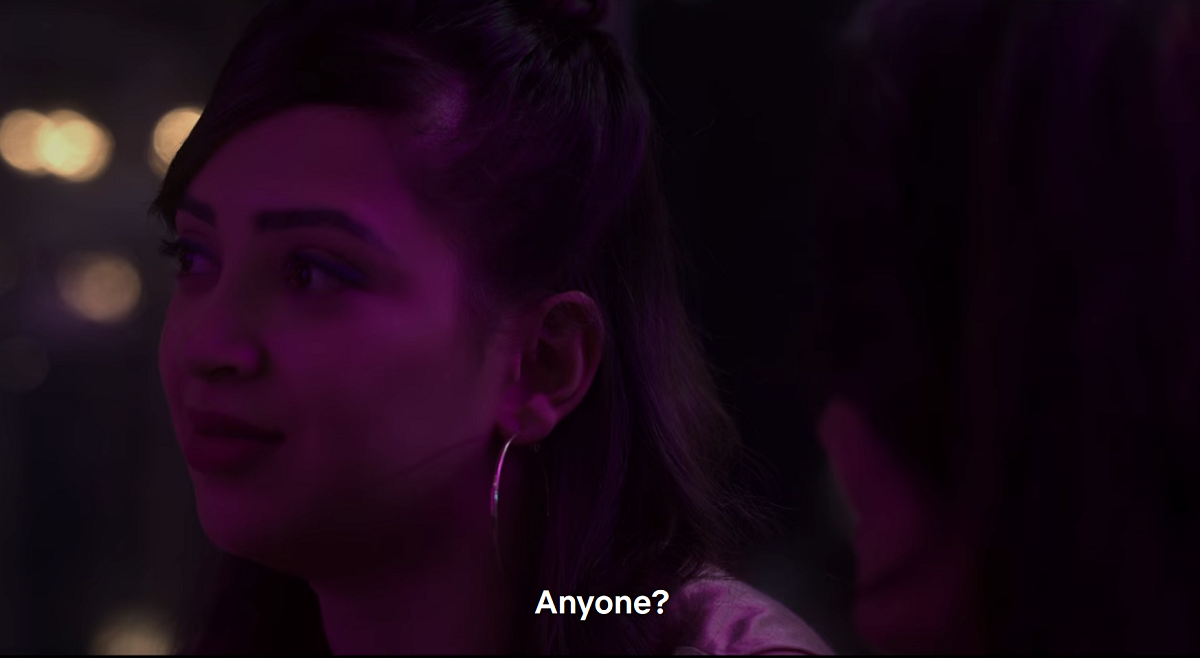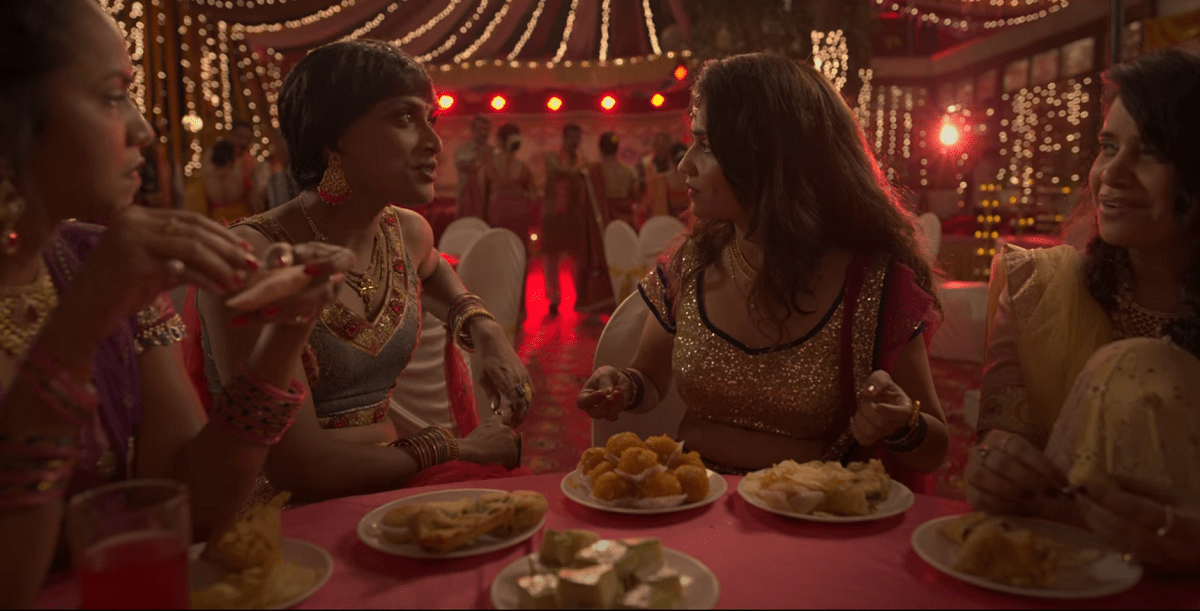Mild Bombay Begums queer storyline spoilers below!
My parents never wanted to immigrate. They came to the States on a fellowship and stayed when that got extended and stayed when that led to a full-time position and stayed when that led to another job and again and again and again. They tried, a few times, to return to India, most notably in my memories, when I was seven, and we packed up everything we could, sold or threw out the rest, got on a plane, and my sisters and I spent agonizingly hot, long, humid days at my grandparents’ house in New Delhi while my parents looked for work.
None of it ever panned out, and in the 2010s, when I was in my mid-twenties, financially independent and living on my own — the issue no longer relevant to my life — they gave up, resigning themselves to spending the rest of their days in the U.S.
I’ve often wondered what would have happened to me if they had ever succeeded? That question took on a new urgency in the last few years as I came into my queerness. I know there are robust queer, feminist and activist communities in India. And yet, my family is so conservative. Even in the U.S., my parents never let me leave the house on my own growing up (I didn’t even have my own house key) and insisted that absolutely everything stay within the family. The only resources my sisters and I had to see that life could hold more possibility than the arranged marriages in store for us were libraries and school. In India, they almost certainly would have had far more control over the messages we got from both.
But I have no idea what living in India is actually like. I’m often trying to piece it together based on the bits I gather from the news, the media and my family. The more recent shows and movies I’ve watched, like Four More Shots Please and Lust Stories, with their explicit depictions of sex and discussions of women’s desires shocked my naïve understanding of Indian media, given that everything I had seen before was limited to heavily censored Bollywood movies and family dramas nearly two decades out of date. But they also don’t square with what I see playing out in the lives of my cousins who still live in the country.
Against that backdrop, the new Netflix original series Bombay Begums bridges some of those divides and has shown me what feels like a real glimpse of what that unknowable alternate reality might have been.
Bombay Begums (or “Bombay Queens”) follows five women living in Mumbai. We have Rani Singh Irani (in a comeback role of the acclaimed ’90s Bollywood actress Pooja Bhatt), the new CEO of Royal Bank of Bombay who will pay any price to hold onto the position she has spent her life working toward. Then there’s Fatima Warsi (Shahana Goswami), a rising star at Royal Bank who wants to pursue her ambitions but whose husband expects her to become a stay at home mom after their fifth round of IVF has finally succeeded. Also working at Royal Bank is Ayesha Agrawal (Plabita Borthakur), a young woman from Indore who moved to Mumbai on her own. Laxmi “Lily” Gondhali (Amruta Subhash) is a dancer and sex worker who knows how to hold her own in a world that is constantly trying to deny her dignity; her fate becomes intertwined with the rest when Rani’s stepson, driving drunk, hits Lily’s son. And finally, our old-for-her-years narrator, Shai Irani (Aadhya Anand), Rani’s awkward, teenage stepdaughter who is still grieving her mother’s death while trying to find her place in school.
In many ways, Ayesha’s story is the one that binds them all. In the first episode, Fatima fires her for changing the terms of a business contract without permission, almost costing the bank the deal. Crushed, Ayesha returns to the bedroom she has rented in the city, where she’s under heavy surveillance by the landlord/housekeeper. Responding with forced smiles, she lies and evades her way through a video chat with her parents that felt like it could’ve been lifted from my own life. Her parents are pushing her into an arranged marriage she has no interest in, and her mother admonishes her to “stay away from those shameless girls.”
Eventually, she gets thrown out of the apartment for drinking and smoking, the landlord threatening to tell her parents and exclaiming that “girls just like you” are corrupting influences. With nowhere to go, Ayesha returns to the Royal Bank office with all her possessions, and Rani finds her in the bathroom the next morning. Sympathetic to her struggle — Rani herself having come to Mumbai from Kanpur alone — but also self-serving, Rani takes Ayesha’s idea of investing in marginalized women and gives her another job at the bank leading the first social welfare (or corporate social responsibility) project. But with Lily constantly reminding Rani of the debt she owes her — Lily’s silence about the car crash — Rani names Lily as the first beneficiary of the social welfare funds.
Some days after starting her new position, Ayesha attends an after hours work event and becomes enchanted with the jazz singer performing for the evening, Chitra Parthasarthy.

Ayesha (left) and Chitra (right)
We see Chitra through Ayesha’s eyes, her body swaying effortlessly to the rhythms of her song about living freely in the “city of dreams.” After everyone else has left the bar, Ayesha shares a drink with Chitra, their faces drawing closer and closer but ultimately, Chitra observes to Ayesha, “I think you’re rather drunk.” Ayesha starts following Chitra online, listening to her music even though she doesn’t usually listen to jazz. Alongside her growing obsession with Chitra, Ayesha and Lily start working on Lily’s new business venture funded by Royal Bank, spending more time together and eventually becoming friends.
In one of my favorite scenes, an incredibly powerful moment in a show with no shortage of powerful moments, Lily encourages Ayesha to accept her bisexuality. Ayesha and Lily are celebrating Rani’s approval of their business plan at a bar where Chitra is performing. “Have you ever loved someone and not allowed yourself to? Have you ever stopped yourself?” Ayesha asks.
Lily shares her story about a man she loves who moved to Dubai. Eventually, Lily sweeps her memories aside and turns the conversation back to Ayesha saying, “Forget it, now. My time is done. But now it’s your time. Love. Whoever you’re going to love. With your whole heart.”
Ayesha turns to look at Chitra again and asks, hesitatingly, “Anyone?” as Chitra sings to Ayesha, “We’ve been waiting long. For a different song. What a tragedy.”
Lily follows Ayesha’s gaze, and replies, directly, firmly, fully aware of exactly what Ayesha’s asking. “Anyone.”

It’s moments like this that I’ve been desperately searching for in South Asian media these past few years. I want to know, I want to see where queer South Asians summon the courage to be themselves from, in a world where coming out is truly a global struggle. Perhaps that’s more of a reflection of me, of my own failings, that I keep looking for that story and feel dissatisfied by narratives that depict queer identity as one that’s readily claimed in South Asian culture. It’s not that I think every queer story has to be a coming out story, but with so few out South Asian celebrities, I’m not convinced that we’ve moved past the point of needing South Asian coming out stories for us to find ourselves in.
Ayesha decides to pursue Chitra — haphazardly, at first: showing up at her apartment, kissing her and immediately running away to head over to her coworker Ron’s apartment, who she then also kisses. Eventually Ayesha and Chitra start casually dating. Throughout the season, Ayesha’s bisexuality is never denied. Her attraction to Chitra and to Ron and her relationships with both are handled with equal sincerity, both inherent parts of who she is and how she loves.
The commonality across Ayesha’s loves, though, is her struggle to find herself and find a place for herself in Mumbai. She faces countless hurdles to renting an apartment as a single woman, the realtor nagging her that her mother can’t attend the housing interviews and, in one interview, being accused of trafficking children. In the interim, she couch surfs — first staying with her ex-boyfriend and his new partner, then Ron and at one point even Chitra, never able to claim a space of her own outside her relationships.
In the middle of all this, she’s sexually assaulted. Acute trauma and all the stigma surrounding assault become yet another set of challenges Ayesha has to navigate. The assault puts Rani, Fatima and Lily to the test, as well, forcing them to confront the limits of the power they have spent their lives trying to secure.
And that, that is what I love about this show. In seemingly every storyline, Bombay Begums is unsparingly honest about the barriers women face and doesn’t shy away from tackling the intersections of sexism with other forms of oppression. What’s more, it depicts people from marginalized communities in India in ways that aren’t steeped in offensive stereotypes. For instance, among Lily’s recurring group of friends is Beauty, a playful trans woman who calls bullshit when she sees it. While the casual representation of trans women as side characters in mainstream Indian media goes back more than half a century, the vast majority of representations are horribly transphobic, and the roles are often given to cis men. In contrast, trans actress Ivanka Das plays the character of Beauty.

Beauty (center left) and Lily (center right)
The show has its flaws, though. Shai’s story didn’t catch my interest, and while her narrations can be poignant, heart-wrenching observations, the delivery falls flat at times. I’m also conflicted about the implications of Fatima’s storyline. And the rise in Islamophobia across India is conspicuously absent, though Fatima’s Muslim faith is portrayed openly and respectfully, a representation that’s not insignificant in the country’s current political climate.
In the last few weeks, Bombay Begums has been subject to calls to ban it in India because of its depictions of minors engaging in sex and using drugs and alcohol. It’s unclear what will happen, if the show’s creators will be forced to alter those scenes or what this controversy portends for its renewal.
But I hope there’s a second season. At the end of it all, I still have no idea how accurate Bombay Begums’ portrayal of life as a woman in India is, but its themes and characters resonated with me deeply. With strong performances, beautiful cinematography and compelling music — if you’re looking for a short, thoughtful binge watch, I highly recommend it.
Author’s note 4/8/21: This post was revised after it was pointed out to me that I had misread the religious and ethnic heritages of some of the characters.



Sounds interesting and thanks for your story. Is it vieable in netflix europe?
I think so? Based on some googling it seems like it should be available in various European countries and the UK but I can’t 100% confirm for you since I’m based in the US.
I have been looking so hard for any South Asian media that sticks true to what sapphic women experience. So this is super exciting!
I also really resonated with this article. I live in North America but many times growing up, we nearly moved to India and it’s hard to think about how different my life would be. Thank you for writing this.
Thank you so much for reading! I hope you enjoy the show!
Depending on which country you’re in, you may be able to check JustWatch.com (scroll to the bottom of the homepage to set your country)
Great review – this came up on my Netflix the other night and hadn’t heard anything about it but sounds interesting
Thank you & thanks for reading! Yea, this show had largely flown under my radar. I think I saw an advertisement for it when it first came out but I assumed it would be another version of Four More Shots Please and didn’t watch it for weeks until I was prompted to do so by Natalie.
wow himani i got the BIGGEST smile on my face when i realized this is on netflix and i can watch it! someday a roundup of south asian queer web series/tv/movies would be amaaaaaazing <3 somehow i only JUST registered that Signature Move exists (and immediately watched it on fandangonow and LOVE it).
Oh I haven’t heard of Signature Move, but I’ll have to check it out! There’s a ton of South Asian media I don’t know, so I myself would also greatly benefit from the round up you’re suggesting :)
THANK YOU FOR WRITING THIS! I’ve been waiting for this show to be on Autostraddle’s radar for WEEKS.
My only real comment is – I thought Rani’s husband is Parsi, not Muslim? Mostly from that first scene where Rani makes a comment like, “There’s nothing like my husband’s Parsi chai” or something…I’m curious what made you think he’s Muslim? I’m just genuinely obsessed with the show & want to understand it better, so wanna know if there’s something I missed.
thank you AGAIN. Also if you don’t want to have a convo over comments, would love to IG message about this – @postcardsfrommat (I’m also obsessed with the husband’s grief / sex storyline – I’ve never ever ever seen this depicted in any kind of media – but that’s maybe a different conversation!)
Hi Mary Ann! Thanks so much for reading! I unfortunately don’t have IG but I would love to chat more about this show here or we can connect over email as well (message me at: himani[at]autostraddle[dot]com and we can take it from there)
That’s such a fascinating point about Rani’s husband and betrays my own ignorance! Honestly, I was going by names and so I assumed that with names like Naushad, Zenobia, Zuravar that her husband and stepkids were Muslim at least by heritage. But you’re right about Rani’s comment about Parsi chai. I didn’t realize that Parsi was a specific community in India (only know this now after looking it up after reading your comment) — I always thought it just meant “Persian.”
And yea, the grief/sex storyline with Naushad is super interesting as well. As with so many things in that show, I honestly didn’t know how to feel about Rani’s response to the situation (by which I mean her getting mad at him and her comment about “How many years have I been waiting?”) — it’s like I get where she’s coming from but I also get where he is coming from. What were your thoughts on it?
Haha, yes re: revealing what we don’t know! ngl, after the first 3 episodes I checked in with a friend from the subcontinent and was like – okay I think this is what everyone’s religions are, but can you verify? & that was super helpful for me! cos I had made certain assumptions and wasn’t right about everything.
I mean the first time it showed up, I thought it was super interesting that Naushad actually said Zenobia’s name during sex – that it seemed like a negotiated part of their sex life, that he had an opportunity to relive the love for his late wife with Rani and that she accepted it. I’ve definitely never seen or even considered the way that sex & fantasy could be a part of a grieving process for a lover who’s died. & then that Rani’s affair was also seemed like a negotiated, accepted part of their relationship – like they accepted that they weren’t everything to each other, and also that they had needs that needed fulfilment in different ways for each of them. which was just…honestly kind of mindblowing to me. I’ve never seen that play out in a generally not-dramatic / chaotic way on screen! & I think the “How many years have I been waiting” in some ways made sense to me- like, I loved how the show gave all the women the space to be angry / express their genuine emotions in real time. & like yes that was a hurtful comment but – OMG towards the end when she brings out the wedding saree? That he wears when he masturbates about Zenobia? And she wears Zenobia’s wedding saree and he cries? I was like WOW…it really just blew me away, as a gesture and healing practice…& I guess i kind of felt like that “How many years have I been waiting” comment was (for me) forgiven by that gesture.
& ok yes this got long! can def go to email if that’s better – i’m maryatho(at)gmail(dot)com! THANK YOU again for writing this!!
OMG – so much to discuss here! I sent you an email as it may be easier? Certainly easier to get notifications on and track!
Thanks again to Mary Ann for pointing out that Rani’s husband is Parsi. I’ve updated the post to remove the reference to Naushad being Muslim, as that was a misreading of him and his family. I absolutely meant no disrespect to the Parsi community and this whole conversation has been a real learning opportunity for me. As always, I really welcome comments and discussion on my posts as it helps me examine my own biases and blindspots. Thank you again!